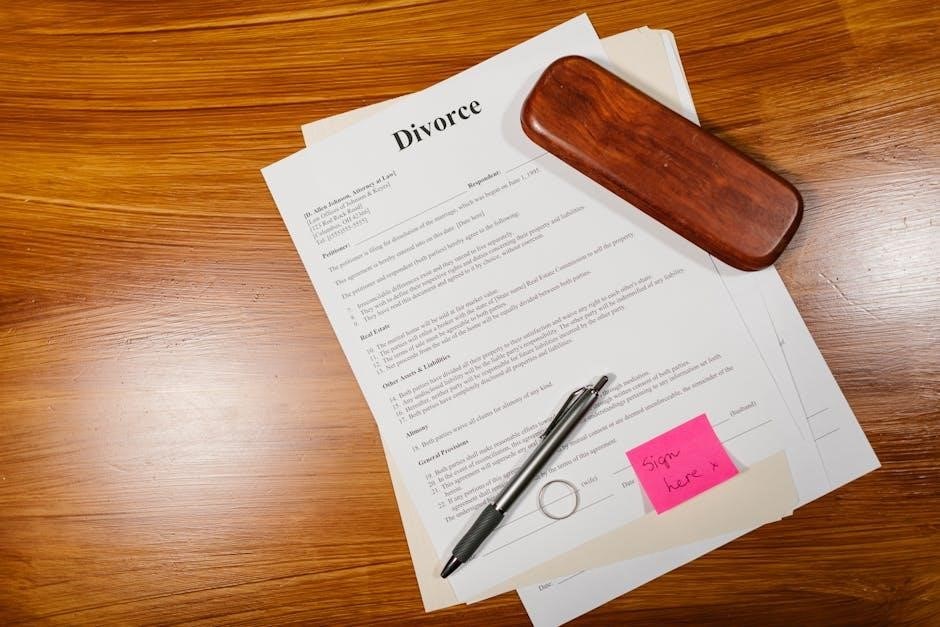The New Jersey Power of Attorney Form PDF is a legal document enabling individuals to grant authority to another person to manage their financial‚ healthcare‚ or property matters. It ensures convenience‚ protection‚ and flexibility in decision-making‚ available in PDF format for easy access and completion.
1.1 What is a Power of Attorney (POA)?
A Power of Attorney (POA) is a written document where an individual‚ known as the principal‚ grants authority to another person‚ called the agent‚ to act on their behalf. It allows the agent to handle financial‚ legal‚ and personal matters as specified by the principal under New Jersey law. The POA ensures continuity in decision-making‚ even if the principal becomes incapacitated‚ and is essential for managing affairs effectively.
1.2 Importance of Using a Power of Attorney in New Jersey
Using a Power of Attorney in New Jersey is crucial for ensuring continuity in decision-making‚ especially if the principal becomes incapacitated. It allows the agent to manage finances‚ healthcare‚ and property‚ preventing the need for costly legal interventions like guardianship. A POA provides flexibility‚ peace of mind‚ and ensures the principal’s wishes are respected‚ making it an essential legal tool for residents.

Types of Power of Attorney Forms in New Jersey
New Jersey offers various Power of Attorney forms‚ including Durable‚ Limited‚ and Healthcare POAs. Each type caters to specific needs‚ ensuring tailored authority for financial‚ medical‚ or limited tasks.
2.1 Durable Power of Attorney
A Durable Power of Attorney (DPOA) remains effective even if the principal becomes incapacitated‚ ensuring uninterrupted management of financial and legal affairs. It is ideal for long-term planning and continuity‚ granting the agent authority to act on behalf of the principal despite disability or incapacity‚ as governed by New Jersey statutes.
2.2 Limited Power of Attorney
A Limited Power of Attorney grants an agent specific‚ restricted authority to act on behalf of the principal‚ typically for a particular transaction or period. It allows the principal to retain control over most decisions while delegating selected tasks‚ offering flexibility and tailored solutions for unique situations as outlined in New Jersey legal frameworks.
2.3 Healthcare Power of Attorney
A Healthcare Power of Attorney allows a principal to appoint an agent to make medical decisions if they become incapacitated. This form ensures the agent can access medical records‚ consent to treatments‚ and carry out the principal’s healthcare wishes as specified in the document‚ adhering to New Jersey’s Advance Directives for Healthcare Act.
Legal Requirements for a Valid Power of Attorney in NJ
A valid New Jersey Power of Attorney must comply with state laws‚ including the Revised Durable Power of Attorney Act‚ requiring the principal’s capacity and written consent.
3.1 Governing Laws and Statutes
The New Jersey Power of Attorney is governed by the Revised Durable Power of Attorney Act (N.J.S.A. 46:2B-8.1 to 46:2B-19) and the Advance Directives for Health Care Act (N.J.S.A. 26:2H-53 to 26:2H-78). These statutes define the requirements for creating‚ executing‚ and enforcing a valid POA‚ ensuring compliance with state laws and protecting the rights of both the principal and the agent.
3.2 Execution Requirements (Signature‚ Witnesses‚ Notarization)
A New Jersey Power of Attorney must be signed by the principal‚ witnessed by two individuals‚ and notarized to ensure authenticity. The principal must be mentally competent‚ and witnesses should not have a conflict of interest. Proper execution is crucial for the document to be legally binding‚ complying with New Jersey’s statutory requirements for validity and enforceability.

Completing the New Jersey Power of Attorney Form
Completing the New Jersey Power of Attorney Form involves accurately filling in details about the principal‚ agent‚ and scope of powers‚ ensuring clarity and legal compliance.
4.1 Downloading the Form (PDF Format)
The New Jersey Power of Attorney Form is readily available for download in PDF format from official state websites and legal resources. Ensure the form is downloaded from a trusted source to guarantee accuracy and compliance with current laws. Once downloaded‚ save and print the form for easy access and preparation. Always verify the form’s version and requirements before proceeding.
4.2 Filling Out the Form (Principal‚ Agent‚ Powers Granted)
When completing the New Jersey Power of Attorney Form‚ clearly identify the principal (the person granting authority) and the agent (the person receiving authority). Specify the powers granted‚ such as financial‚ healthcare‚ or property management. Ensure all sections are filled accurately‚ and the form is signed by the principal. Witnesses and notarization may be required for validity‚ depending on the type of POA chosen.

Revoking or Terminating a Power of Attorney in NJ
A Power of Attorney in New Jersey can be revoked by the principal through a written notice or automatically due to events like death‚ incapacitation‚ or revocation.
5.1 How to Revoke a Power of Attorney
To revoke a Power of Attorney in New Jersey‚ the principal must provide a written notice of revocation to the agent. The document should be notarized for authenticity. The principal or their authorized representative must deliver the revocation notice to the agent and any relevant third parties. Once notified‚ the agent must cease acting under the POA immediately.
5.2 Events That Automatically Terminate a POA
A Power of Attorney in New Jersey automatically terminates under specific circumstances. These include the principal’s death‚ revocation by the principal‚ or the occurrence of a termination event outlined in the document. Additionally‚ if the POA is non-durable‚ it ends when the principal becomes incapacitated. Upon termination‚ the agent must immediately cease acting under the POA.
Common Uses of a New Jersey Power of Attorney
A New Jersey Power of Attorney is commonly used for financial management‚ healthcare decisions‚ real estate transactions‚ tax matters‚ and legal affairs‚ ensuring efficient decision-making.
6.1 Financial Management
A New Jersey Power of Attorney is widely used for managing financial affairs‚ including bank accounts‚ investments‚ tax matters‚ and real estate transactions. The agent can oversee bill payments‚ budgeting‚ and asset management‚ ensuring financial stability and continuity‚ even if the principal becomes incapacitated. This authority allows the agent to act in the principal’s best interest‚ maintaining control over financial decisions.
6.2 Healthcare Decisions
A New Jersey Power of Attorney allows the agent to make healthcare decisions for the principal‚ including life-sustaining treatments‚ if the principal is incapacitated. This authority is separate from financial powers and is often outlined in a Healthcare Power of Attorney. The agent must act in the principal’s best interest‚ adhering to their wishes as specified in the document‚ ensuring medical decisions align with the principal’s preferences and values.
6.3 Real Estate Transactions
A Power of Attorney in New Jersey can authorize an agent to handle real estate transactions‚ such as buying‚ selling‚ or managing property. This includes executing deeds‚ attending closings‚ and making decisions regarding property use or refinancing. The agent’s authority is defined within the POA document‚ ensuring the principal’s interests are represented in all real estate matters‚ providing flexibility and legal oversight for property-related decisions.

Benefits of Having a Power of Attorney in New Jersey
A Power of Attorney in New Jersey provides peace of mind by enabling trusted agents to manage affairs‚ protecting assets‚ and ensuring wishes are honored seamlessly.
7.1 Convenience and Flexibility
A Power of Attorney offers unmatched convenience by allowing agents to act on your behalf without direct involvement‚ ensuring seamless management of finances‚ property‚ and healthcare. It provides flexibility‚ enabling the principal to specify when the POA takes effect—immediately or upon incapacitation. This ensures decisions align with your wishes‚ offering peace of mind and streamlining processes during critical times.
7.2 Protection of Assets and Interests
A Power of Attorney safeguards your assets and interests by ensuring decisions are made according to your wishes; It prevents misuse by granting authority to a trusted agent‚ who must act in your best interest. Legal safeguards are in place to protect you‚ and the document can be tailored to specify limits‚ ensuring your financial and personal affairs remain secure and managed responsibly.

Where to Find the Official New Jersey Power of Attorney Form
The official New Jersey Power of Attorney Form can be found on the state’s legal websites‚ such as the New Jersey Judiciary or official government portals.
8.1 Official State Websites
The official New Jersey Power of Attorney Form can be downloaded from the New Jersey Judiciary website or other state-sponsored legal portals. These platforms provide free‚ legally compliant templates in PDF format‚ ensuring accuracy and adherence to New Jersey laws. Using official state websites guarantees the form’s validity and compliance with current statutes.
8.2 Legal Aid Resources
Legal aid resources in New Jersey provide assistance for individuals seeking to complete a Power of Attorney form. Organizations like Legal Services of New Jersey offer free or low-cost legal guidance‚ ensuring forms are filled out correctly. These resources often include downloadable PDF templates‚ step-by-step instructions‚ and workshops to help individuals understand and execute the document effectively.

Tips for Creating a Power of Attorney in New Jersey
When creating a Power of Attorney in New Jersey‚ choose an agent you trust‚ include specific instructions‚ and ensure the document complies with state laws for validity.
9.1 Choosing the Right Agent
Selecting the right agent for your New Jersey Power of Attorney is crucial. Choose someone trustworthy‚ reliable‚ and capable of managing your affairs. Ensure they understand your wishes and are willing to act in your best interest. Consider their integrity‚ decision-making skills‚ and availability. Discuss your expectations and any specific instructions with them to avoid misunderstandings. This ensures your interests are protected effectively.
9.2 Including Special Instructions
Including special instructions in your New Jersey Power of Attorney ensures your agent understands your preferences and boundaries. Specify how you want your finances‚ property‚ or healthcare managed. You can outline particular powers‚ limitations‚ or priorities. This customization helps protect your interests and ensures decisions align with your values. Clear instructions prevent misunderstandings and provide guidance for your agent.
10.1 Final Thoughts on the Importance of a POA
A Power of Attorney is an indispensable legal tool‚ ensuring your interests are protected and your wishes are honored even when you cannot act for yourself. It offers flexibility‚ peace of mind‚ and a clear framework for decision-making. Every individual should consider having a POA in place to safeguard their future and maintain control over their affairs.
10.2 Next Steps After Completing the Form
Once the New Jersey Power of Attorney form is completed‚ it must be signed‚ notarized‚ and distributed to the agent and relevant institutions. Ensure the agent understands their responsibilities and keep the original document in a safe place. Provide copies to banks‚ healthcare providers‚ or other parties as needed. Review and update the POA periodically to reflect any changes in circumstances or preferences.
